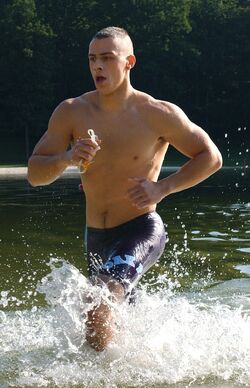No edit summary |
No edit summary |
||
| Line 19: | Line 19: | ||
A person may be said to be ''physically fit'' to perform a particular task with a reasonable efficiency, for example, fit for [[military]] [[service]]. |
A person may be said to be ''physically fit'' to perform a particular task with a reasonable efficiency, for example, fit for [[military]] [[service]]. |
||
| + | ==Effects of physical fitness on cognitive performance== |
||
| − | === Military-style === |
||
| − | In recent years, '''Military-style''' fitness training programs have become increasingly popular among [[civilian]]s. Courses are available all over the [[US]] and [[Europe]]. |
||
| − | |||
| − | They are usually taught by ex-military personnel. Very often the instructors held highly regarded positions within various military organizations. Often times the instructors were formerly [[Drill instructor]]s, [[Special Forces]] Operatives or held otherwise distinguished positions. |
||
| − | |||
| − | These courses always have some common elements. They often focus on military style [[calisthenics]] and group runs. The courses are often held very early in the morning and will meet in almost any weather. Students can expect [[push-up]]s, [[Sit-up (exercise)|sit-ups]], [[Chin-up_bar|pullups]], and [[Jumping Jack|jumping jacks]], as well as more obscure drills such as [[Flutter_kick|flutter kicks]], sun worshippers and [[Flare_(breakdancing_move)|flares]]. Almost invariably a workout will include short runs while longer runs are more scheduled. Special forces are renowned for their level of fitness and intensity of their workouts. |
||
| − | |||
| − | ==Notable fitness instructors== |
||
| − | *[[Billy Blanks]] (Creator of [[Tae Bo]]) |
||
| − | *[[Angelo Siciliano|Charles Atlas]] |
||
| − | *[[Jack LaLanne]] |
||
| − | *[[Dave Leslie]] 'Keeping in Shape' in [[Cambridge, England]] |
||
| − | *[[Richard Simmons]] |
||
| − | |||
| − | |||
==See also== |
==See also== |
||
| + | *[[Aerobic exercise]] |
||
*[[Exercise]] |
*[[Exercise]] |
||
*[[Health]] |
*[[Health]] |
||
| − | *[[ |
+ | *[[Physical endurance]] |
| − | *[[Physical |
+ | *[[Physical strength]] |
| + | |||
| − | *[[President's Council on Physical Fitness and Sports]] |
||
[[Category:Health]] |
[[Category:Health]] |
||
[[Category:Exercise]] |
[[Category:Exercise]] |
||
| + | |||
[[cs:Fitness]] |
[[cs:Fitness]] |
||
[[de:Fitness]] |
[[de:Fitness]] |
||
Revision as of 00:13, 28 May 2009
Assessment |
Biopsychology |
Comparative |
Cognitive |
Developmental |
Language |
Individual differences |
Personality |
Philosophy |
Social |
Methods |
Statistics |
Clinical |
Educational |
Industrial |
Professional items |
World psychology |
Clinical: Approaches · Group therapy · Techniques · Types of problem · Areas of specialism · Taxonomies · Therapeutic issues · Modes of delivery · Model translation project · Personal experiences ·

Physical fitness is an attribute required for service in virtually all militaries.
The notion of physical fitness is used in two close meanings.
General fitness
In its most general meaning, physical fitness is a general state of good physical health. A physically handicapped person's body may be physically fit (healthy), though its ability is likely to be less than optimum.
Physical fitness is a result of regular physical activity, proper diet & nutrition, and proper rest for physical recovery within the parameters allowed by the genome.
Physical fitness is often divided into six types:
- Flexibility
- Cardiovascular endurance
- Muscular strength and endurance
- Agility
- Balance
- Speed
Task-oriented fitness
A person may be said to be physically fit to perform a particular task with a reasonable efficiency, for example, fit for military service.
Effects of physical fitness on cognitive performance
See also
cs:Fitness de:Fitness he:כושר גופני nl:Fitness
| This page uses Creative Commons Licensed content from Wikipedia (view authors). |